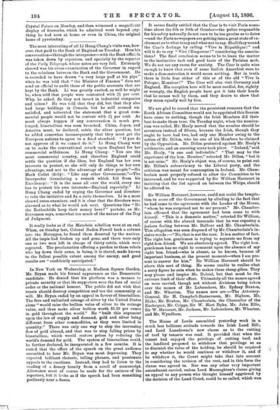Sir• William Harcourt, however, could not resist the tempta- tion
to score off the Government by alluding to the fact that he had come to the agreement with the Leader of the House,. "whom he was surprised not to see present." Mr. Chamber- lain affirmed that the agreement had been come to with• himself. "This is a domestic matter," retorted Sir William,. of course with the absurd innuendo that he was exposing a jealous feeling between Mr. Balfour and Mr. Chamberlain. This allegation was soon disposed of by Mr. Chamberlain's in- cisive words :—" No, that is not the case. It is a matter of fact. The right hon. gentleman is trying to separate me from my right bon. friend. We are absolutely agreed. The right hon. gentleman has no right to comment upon the absence of my- right hon. friend—who is absent, as he knows, because of important business, at the present moment—when I am pre- sent to answer for him." Sir William Harcourt should be above this eort of thing. He seems unable to realise what a sorry figure he cuts when he makes these cheap gibes. They may please and inspire Mr. Dalziel, but that must be the extreme limit of their effect. Ultimately all the names agreed on were carried, though not without divisions being taken over the names of Mr. Labouchere, Mr. Sydney Buxton,. and Mr. Wharton. The names now are :—The Attorney- General, Sir H. Campbell-Bannerman, Mr. Bigham, Mr.. Blake, Mr. Buxton, Mr. Chamberlain, the Chancellor of the Exchequer, Mr. Cripps, Sir W. Hart Dyke, Mr. John Ellis, Sir W. Harcourt, Mr. Jackson, Mr. Labouchere, Mr. Wharton,. and Mr. Wyndham.


































 Previous page
Previous page